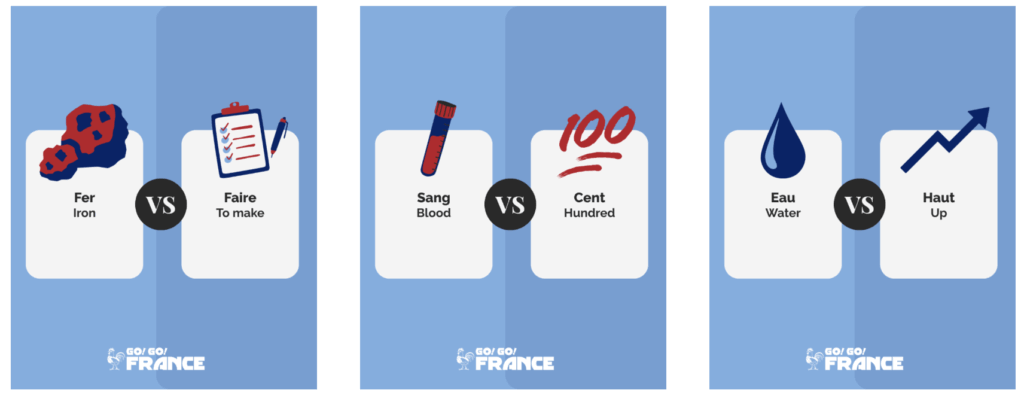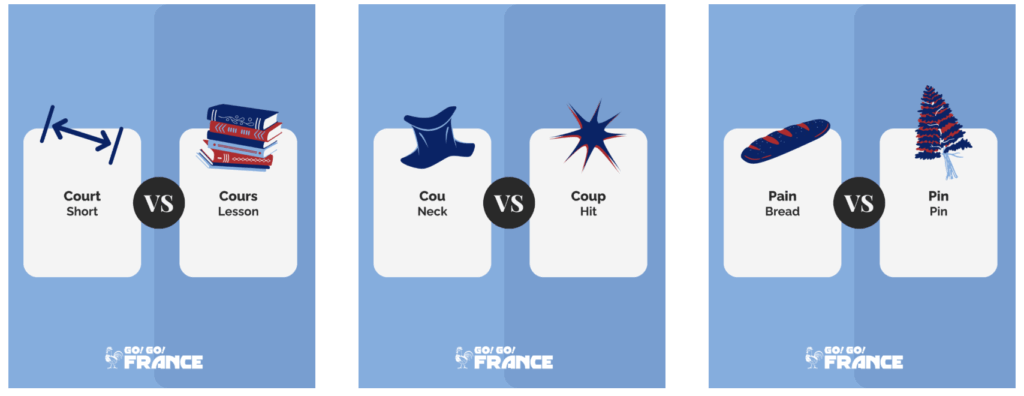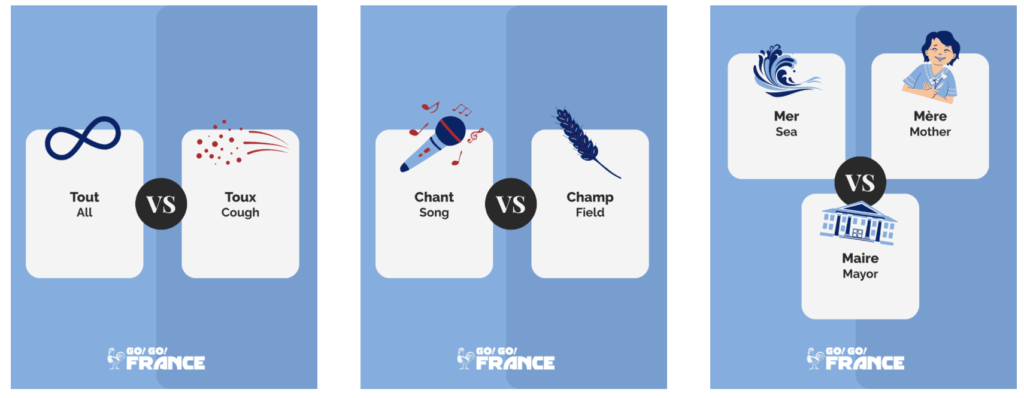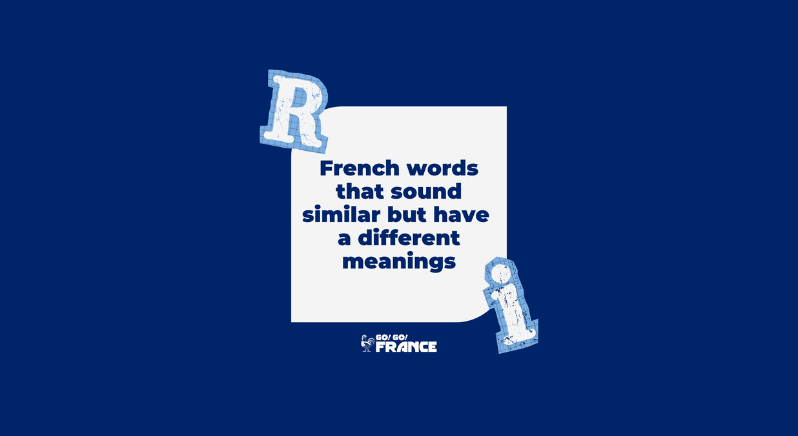One of the most confusing aspects of learning French? Many words sound almost identical but mean entirely different things.
In this article, we’ll explore some of the most common French sound-alike words—terms that share the same pronunciation but differ in spelling, grammar, and meaning.
Why French pronunciation and spelling can be confusing
French is known for its unique pronunciation system, shaped by:
- Nasal vowels: as in pain (bread) or vin (wine)
- Silent letters: often at the ends of words, like temps (time) or fils (son)
- Liaison: where the final consonant of a word links to the next word beginning with a vowel sound
French spelling also preserves historical forms from Latin, but over time, pronunciation has evolved—and today, many written words no longer match the way they sound. For example:
- Beaucoup (many) is pronounced boh-koo, with a silent “p”
- Fils (son) is pronounced fees, with a silent “l”
- Oiseau (bird) contains multiple silent letters and vowel combinations that don’t align with modern pronunciation

Common French homophones
Below is a short list of commonly confused French sound-alike words. Use these examples to train your ear, improve comprehension, and build confidence in both spoken and written French.
Check out our Instagram page to hear native speakers pronounce these sound-alike words out loud. It’s a fun way to train your ear—just play the video and try repeating after us!
| Sound-alike words | Examples |
|---|---|
| Fer (Iron) Faire (To do/make) | Le fer est un métal lourd. Iron is a heavy metal. Je vais faire mes devoirs. I’m going to do my homework. |
| Sang (Blood) Cent (Hundrer) | Il a perdu beaucoup de sang. He lost a lot of blood. Il a cent euros. He has one hundred euros. |
| Eau (Water) Haut (Up) | Je bois de l’eau. I’m drinking water. Le mur est très haut. The wall is very tall. |
| Court (Short) Cours (Class / Lesson) | Le pantalon est trop court. The pants are too short. J’ai un cours de français. I have a French class. |
| Cou (Neck) Coup (Hit) | Il a mal au cou. His neck hurts. Un coup de vent a renversé l’arbre. A gust of wind knocked over the tree. |
| Pain (Bread) Pin (Pine tree) | J’achète du pain chaque matin. I buy bread every morning. Ce pin est très grand. This pine tree is very tall. |
| Tout (All) Toux (Cough) | Tout est prêt. All is ready. Il a une toux sèche. He has a dry cough. |
| Mer (Sea) Mère (Mother) Maire (Mayor) | La mer est calme aujourd’hui. The sea is calm today. Ma mère est enseignante. My mother is a teacher. Le maire va parler ce soir. The mayor is going to speak tonight. |
| Chant (Song) Champ (Field) | Le chant des oiseaux est agréable. The birds’ song is pleasant. Le champ est couvert de fleurs. The field is covered with flowers. |

Same sound but different spelling in French
French is full of sounds that are pronounced the same, even though their spelling varies greatly. Recognizing these patterns is essential for improving both your pronunciation and spelling.
Here’s a quick-reference table:
| Sounds | Common spellings | Examples |
|---|---|---|
| [o] (as in eau) | -o, -au, -eau, -os | mot (word), faux (false), eau (water), gros (big) |
| [ɑ̃] (nasal) | -ent, -ant | lent (slow), enfant (child) |
| [ɛ̃] (nasal) | -in, -ain, -ein | vin (wine), pain (bread), plein (full) |
| [u] | -ou | fou (crazy), loup (wolf) |
| [ɛʁ] | -er, -ez, -é | parler (to speak), vous mangez (you eat), café (coffee), marché (market) |
| [wa] | -oi, -oy | moi (me), voyage (trip) |
| [œ̃] (nasal) | -un, -um | un (one), parfum (perfume) |
| [ɛ] | -ai, -è, -ê, -et | mais (but), père (father), tête (head), ballet (ballet) |

Take your French further with Go! Go! France
Memorizing vocabulary is helpful—but living the language is how you truly master it. Living and studying in France is the best way to make fast progress in French and to develop an authentic accent.
When you’re surrounded by native speakers, you naturally begin to absorb pronunciation, rhythm, and real-life usage—without even realizing it. Isn’t that magic? Not quite—it’s immersive learning. And it works.
Whether you’re a beginner or an advanced learner, immersion has unmatched benefits. If you want to improve your pronunciation, the best place to learn French is in France.
Contact us to find the perfect immersion program and language school for you.





